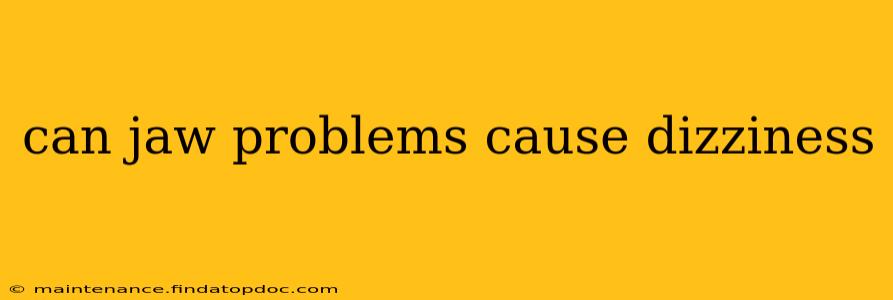Dizziness is a common complaint, and while many associate it with inner ear problems, it's crucial to understand that jaw problems can also be a contributing factor. Temporomandibular joint (TMJ) disorders can indeed cause dizziness, often in ways that are subtle and easily overlooked. This comprehensive guide will explore the intricate relationship between jaw problems and dizziness, answering common questions and providing valuable insights into diagnosis and treatment.
What is the Temporomandibular Joint (TMJ)?
Before diving into the connection between TMJ disorders and dizziness, let's briefly understand the TMJ itself. The temporomandibular joint is the hinge connecting your jawbone to your skull, located just in front of your ears. It's a complex joint responsible for a wide range of movements, from chewing and talking to yawning and swallowing. Dysfunction in this joint, often termed TMJ disorder (TMD), can lead to a variety of symptoms, with dizziness being a significant one.
How Can Jaw Problems Lead to Dizziness?
The link between jaw problems and dizziness isn't always straightforward. The mechanisms are complex and can involve several interconnected factors:
-
Cranial Nerve Involvement: Several cranial nerves responsible for balance and coordination pass near or through the TMJ. Problems with the TMJ, such as inflammation or misalignment, can put pressure on these nerves, leading to dizziness, vertigo, and balance issues. The trigeminal nerve (CN V), for example, plays a critical role in jaw movement and sensation and can be affected by TMJ dysfunction.
-
Proprioceptive System Disruption: Our proprioceptive system allows us to sense our body's position and movement in space. The TMJ plays a crucial role in this system. When the TMJ is misaligned or dysfunctional, it can disrupt proprioceptive input, leading to feelings of dizziness and unsteadiness.
-
Muscle Tension and Headaches: TMD often presents with significant muscle tension in the jaw, neck, and shoulders. This tension can lead to tension headaches, which are a known cause of dizziness. The tightening of these muscles can also affect blood flow to the brain, potentially contributing to dizziness.
-
Vertebral Artery Issues: In some cases, severe TMJ disorders can affect the vertebral arteries, which supply blood to the brain. While rare, compression or irritation of these arteries can cause dizziness and even more serious neurological symptoms.
Can TMJ Problems Cause Vertigo?
Yes, TMJ problems can cause vertigo, a sensation of spinning or whirling. This is often because of the impact on the vestibular system, which is responsible for balance and spatial orientation. The proximity of the TMJ to the inner ear structures and the intricate network of nerves connecting these areas can contribute to this vertigo-like sensation.
What are the Other Symptoms of TMJ Disorders?
While dizziness is a significant symptom, TMD presents with a wide range of other symptoms. Recognizing these can help in early diagnosis and treatment. These can include:
- Jaw pain and tenderness
- Clicking or popping sounds in the jaw
- Limited jaw movement
- Headaches
- Earaches
- Neck pain
- Facial pain
How is a TMJ-Related Dizziness Diagnosed?
Diagnosing TMJ-related dizziness requires a thorough examination by a healthcare professional. This usually involves:
- Physical examination: Checking the range of motion in your jaw, palpating for tenderness and muscle spasms.
- Imaging studies: X-rays, CT scans, or MRIs may be used to assess the structure of the TMJ and rule out other potential causes.
- Neurological examination: To assess cranial nerve function and rule out other neurological issues.
- Detailed medical history: Gathering information about your symptoms, their duration, and any other relevant medical conditions.
What are the Treatment Options for TMJ-Related Dizziness?
Treatment for TMJ-related dizziness focuses on addressing the underlying TMJ disorder. Options may include:
- Conservative treatments: These include pain relief medications, muscle relaxants, physical therapy, and bite guards (or splints). Physical therapy plays a critical role in improving jaw mobility and reducing muscle tension.
- Injections: Corticosteroid injections can reduce inflammation in the TMJ.
- Surgery: In severe cases that don't respond to conservative treatments, surgery may be considered, but this is less common.
When Should I Seek Medical Attention?
If you are experiencing dizziness along with jaw pain, clicking, or limited jaw movement, it's essential to consult a doctor or dentist specializing in TMJ disorders. Prompt diagnosis and treatment can significantly improve your symptoms and prevent long-term complications. Don't ignore persistent dizziness; it could be a sign of an underlying condition that needs attention.
This information is intended for general knowledge and informational purposes only, and does not constitute medical advice. It is essential to consult with a qualified healthcare professional for any health concerns or before making any decisions related to your health or treatment.
